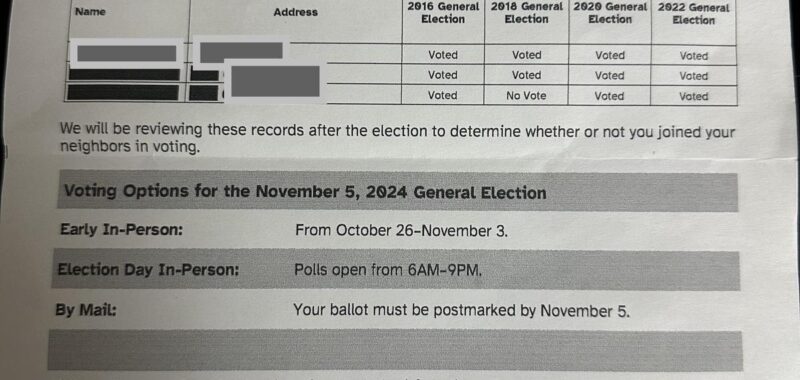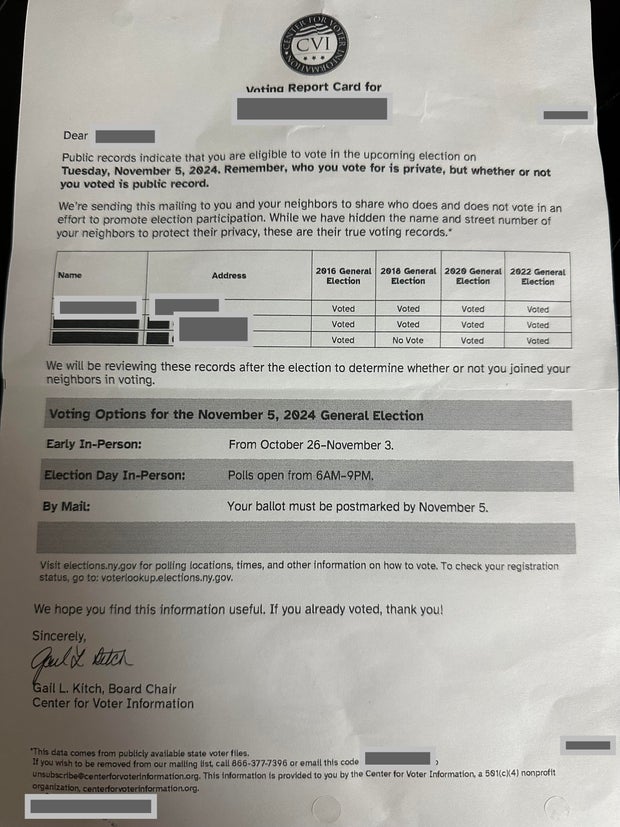Julia Ramsey is used to a deluge of election-related mail. Campaign mailings have clogged her Pennsylvania mailbox day after day for months, but one she received this week stood out from the rest.
It made Ramsey feel like she was being “vote shamed.”
The mailing was among millions sent this week by a pair of tax exempt organizations, letters purporting to be “Voting Report Cards.” They show whether each recipient voted in recent elections, as well as a table of what appears to be redacted neighbors’ names, addresses and voting histories.
“Remember, who you vote for is private, but whether or not you voted is public record,” read the letters, sent by the Center for Voter Information and Voter Participation Center. We’re sending this mailing to you and your neighbors to share who does and does not vote in an effort to promote election participation.
CBS News
On social media, and in interviews with CBS News, recipients have complained the letters are “creepy” and the tone “threatening.”
But the organizations’ president, Tom Lopach, said they’re a useful way to drive voter turnout, and have led to millions of voter registrations in previous years.
“Through the testing we’ve done with randomized control trials, what we see is that the tool that most effectively motivates people is having an understanding of what their neighbors are doing and feeling like it is a societal norm to do what other people are doing,” Lopach said.
He said the two organizations have sent some 113 million mailings this year. The Voter Participation Center, a 501(c)(3) nonprofit, focuses on people who “underrepresented in our electorate,” Lopach said, “such as people of color, young people, and unmarried women.” The Center for Voter Information, a 501(c)(4) social welfare organization, “focuses on folks who are not in those three populations, but who share the values of wanting a representative and inclusive electorate,” he said.
Before leading the Center for Voter Information, Lopach worked for Democratic senators and governors for two decades. Republicans have frequently pointed to Lopach’s history as evidence for their claim his organizations are aligned with Democrats. Lopach said the Voter Participation Center is required to be nonpartisan, as 501(c)(4) tax exempt organization.
“We walk hand in hand with our lawyers on everything we do to ensure we are complying with the law,” Lopach said.
The “Voter Report Card” mailings this week caught the eye of the office that oversees elections in New Mexico.
“If you got a ‘Voter Report Card’ in your mailbox recently, here’s what to know,” the office of the New Mexico Secretary of State wrote in a Facebook post Wednesday. “These mailers come from the Voter Participation Center and/or the Center for Voter Information and are not affiliated with NM’s county clerks or the Secretary of State.”
“No one, not even election workers, can tell your ballot choices — but your voting record is public information,” the office wrote. “If you want to be removed from future mailings of this kind, follow the directions on the bottom of the mailer.”
Ramsey said she tried calling the phone number at the bottom of the mailer.
“I called because I wanted to complain, and it just went right to voicemail,” said Ramsey.
“I don’t like that it’s shaming people,” said Ramsey, who previously worked for Democratic causes, but plans to vote for a third party candidate this year. “It’s just sort of that tactic of like, ‘We can look it up and throw it in your face.'”
New Jersey resident Erika Kiera described the “Voter Report Card” she received as “threatening” and like “a comparison as to who is “better than who” with regard to voting attendance.”
“They state underneath the addresses that they will be reviewing records after this election to determine whether or not you voted, which sounds like they are watching me,” Kiera said. “And I question, what are they going to do if I don’t vote? Are they going to write me and try to threaten or shame me? Are they going to tell my neighbors?”
Lopach said he’s heard from people who are “uncomfortable” with the mailings, but argued, “what I think matters at the end of the day is having a truly representative electorate.”
“If a person finds the language in this letter objectionable, I think the best thing that they can do is recycle the letter and turn out and vote,” Lopach said.
Kiera contrasts that approach with another voter outreach effort she encountered, and prefers.
“I also got a sweet postcard from an individual encouraging voting and it was thoughtful, kind and encouraging,” Kiera said of the handwritten note, which she showed to CBS News. “That gave me a very different feel.”


